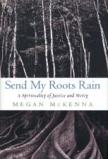A Voice for the Voiceless
Not very long ago, the only people who knew about Megan McKenna were those who heard her lecture in college courses or who were present at conferences, conventions and retreats where she was a featured speaker. Reports filtered back from these occasions that she was an accomplished storyteller who could hold her own with the best of them. Her parables from Christian, Zen, Sufi, Jewish, Native American and other sources were not original, but McKenna gave them surprise spins that freed them to do what parables do best. They engaged people who were certain the stories were about someone else until McKenna, like rabbis of old, held up a mirror so audiences could see that the parables were, in fact, about themselves. She shocked. She cajoled. She provoked. Publishers took notice with offers for McKenna to write things down to reach a larger public, but the verbal medium seemed to be her preferred venue.
And then, about 10 years ago, a dam burst and the books started rolling forth like, well, a flood. For more than the dozen volumes McKenna produced in the last decade, she is sole author. A few have been co-authored: one with Philip Sheldrake, another with Tony Cowan. With the iconographer William Hart McNichols, she wrote text for the exquisite volume Christ All Merciful, and she provided a stunning introduction to The Bride: Images of the Church, by the Jesuit peace activist Daniel Berrigan.
It’s been hard to keep up.
It has also probably been harder for those who wanted to get their feet wet in the tidal wave of McKenna’s words. Where to begin? Fortunately, we now have Send My Roots Rain: A Spirituality of Justice and Mercy, an anthology of McKenna’s writings from 14 of her books, to satisfy both veteran and novice readers.
There is a particular advantage to the author’s sampler approach. It affords small doses, and that is a good way to absorb her. In bite-size portions one can relish the insights and the good writing, because there are plenty of both. Her foreword to Berrigan’s book, reprinted in Rain, for example, is classic McKenna:
The icon declares: Halt! And what brings us to a halt makes us cease emotion. All emotions are portrayed, yet all somehow are brought to a full stop: terror, grief, utter isolation, violence, joy, rage, tenderness, even prayer itself. When emotion is held still, then prayer itself stops and is sustained or held before the mind and body. In this stasis it is sometimes called contemplation.
McKenna evidently knows the power of words. She quotes appreciatively Vaclav Havel, the former president of the Czech Republic, and his denunciation of insidious germs of arrogance in words that are seemingly humble. And she holds herself and us accountable for the words we use, the stories we pass on, the tales that make us more human or less so, that repair breaches or tear apart relationships.
She uses words abstemiously in imaging God, knowing that no words will be adequate but that the idiosyncratic will be more likely than the conventional to catch us off guard. So God is an elephant who is trying to make us remember something. And God is a thief, intent on stealing our sins, our evil, and vengeance, our violence, and all that clutters and stands in the way of hope, of salvation, and of unity among us all. Advent, for McKenna, is the time when God breaks into our house, our world, and steals us blind, shifting all history and saving the lost.
McKenna recommends shunning and exiling words that glorify violence, nationalism, insensitivity to the sufferings of others and recommends honoring those that come from below, from underneath, from those too weak, too old, too young to speak or without access to the dominant forms of communication. Her words are most persuasive when they are placed at the service of those whose voices are dismissed, ignored and gagged.
The prophetic tradition is alive and well in this collection, although the overall effect is gentler than one might expect. Missing are desperate pleas for readers to take up the cause of justiceor else. Without a doubt, McKenna informs us adequately about a catalogue of inequities. But challenges and questions are posed politely (If we were on a scale of one to ten, Where would others who witness our lives place us on the scale?), jabs at our conscience come indirectly, and dire warnings if we do not heed her prophetic messages come not at all.
McKenna has wisely and shrewdly protected our freedom. There is neither pressure nor force exerted in these pages, but rather an invitation to live just a little more humanly, more joyfully, more fully than before. When all is said and done, it’s an invitation we almost can’t refuse.
This article also appeared in print, under the headline “A Voice for the Voiceless,” in the May 19, 2003, issue.








